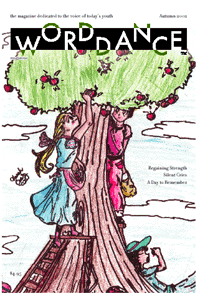Word Dance
Listen to the Recess! Clip
| Author | John Cech |
| Air Date | 2/20/2003 |

Word Dance Transcript
If you have an aspiring young writer in your household, who’s been churning out stories and poems all winter, and is yearning to see her work in print, you might want to find out more about Word Dance. It’s a non-profit magazine that publishes the works of children four times a year, and strives to bring out the best of the many submissions they receive.
Word Dance began nearly a dozen years ago in Connecticut, when its founders, Laura and Stuart Ungar, were looking for a creative writing project that they could bring to the area schools. They polled the state’s principals and learned that a literary magazine for elementary and middle school children would fill a real need locally and, as it happens, nationally. So in 1991, they launched their first issue, from the hundred or so works that had been sent to them by teachers in the state. Now the magazine has a panel of editors to select from the writings it publishes from around the country. Here’s a place where your budding wordsmith can get a real taste of what the professional writer’s life is like (with its regular stream of submissions and, possibly, rejections).
I don’t mean to suggest that there’s something callous or daunting about the process as it’s practiced at Word Dance. It’s a really a child-friendly place that’s open to a wide range of age levels and writing styles. In its mission statement, the magazine affirms “the basic assumption that all children are born with tremendous potential.” And what Word Dance seeks to do is honor that potential and those talents by being careful, in their words, “to ensure that [their] offerings are consistently of the highest quality.” Showcasing this quality, the Ungars felt, would be essential to the process of inspiring other young writers to do their creative best.
You can see samples of the works of some of the Word Dance writers on their web-site at worddance.com. There are stories about vacations and field trips, lyric poems and a haiku corner. In the “Grab Bag” section, you’ll find an eighth graders’ ironic story about a poor shlemiel named Joe who wants to be a detective but can’t seem to get past the appearances of things to reach their reality: he keeps trying to arrest the wrong people and is finally arrested himself for impersonating a detective. Kafka and the Marx Brothers would have loved it.